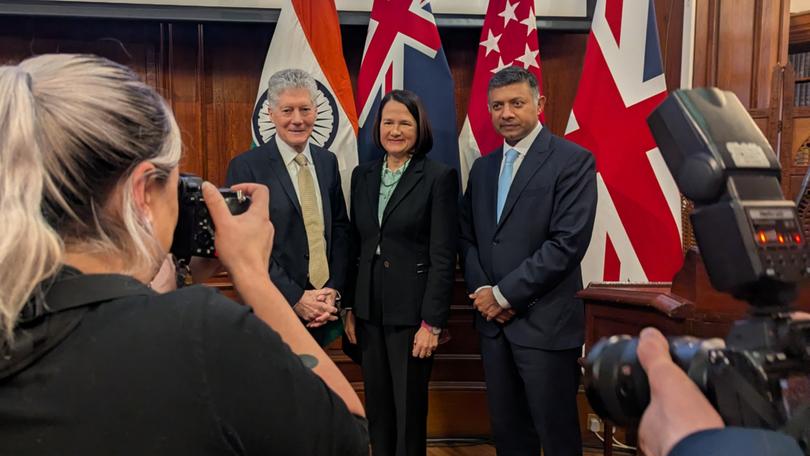Brexit Britain poor, ‘exposed’, and needs to trade with China despite security concerns, minister says
An Australian-born UK minister said security concerns over China had to be balanced with the UK’s need for trade after Brexit left the country in the lurch and voters reliant on charity.

The UK’s Australian-born Indo-Pacific Minister Catherine West has said Britain “unfortunately” needs to grow trade with China despite security concerns because the country is poor after Brexit and too many voters rely on charities for food.
The stunning admission contradicts the UK government’s assurances made to The Nightly before Christmas that it would not be complacent about the challenges China poses.
And it potentially sets the UK on a collision course with its main ally the United States if the incoming Trump Administration maintains a hawkish stance on China.
Sign up to The Nightly's newsletters.
Get the first look at the digital newspaper, curated daily stories and breaking headlines delivered to your inbox.
By continuing you agree to our Terms and Privacy Policy.Speaking in the House of Commons, the Australian-born Indo-Pacific Minister Catherine West said the UK economy was “quite fragile” and that this needed to be balanced with national security concerns.
“Unfortunately, because of our rather exposed position, post Brexit we do have to be outwardly looking in our economy,” Ms West told MPs.
“If we want our residents and our constituents to get away from food banks, we need to have more import-export with the UK, and we need to be very pragmatic on the question of having an economic relationship with the fourth biggest trading partner that we have.
“And it’s hard to tell that because I want to just talk about the other element of the relationship.
“But I know when I go to my constituency and people tell me how hard their lives are and how over the last 14 years our economy has gone into a decline I have to stand up for our economic relationships as well.”
Food banks are British charitable schemes that provide free groceries to people in poverty.
The Trussell Trust which operates 1400 food banks across the UK said that between April 2023 and March 2024, the number of people that used a food bank for the first time was 655,000, an increase of 95 per cent.
Setting aside the huge contraction and spike experienced during the pandemic, Britain’s anaemic economy has struggled to grow at any significant rate for the best part of two decades and in the last recorded quarter, its GDP was zero.
Sophia Gaston, UK Foreign Policy Lead at the Australian Strategic Policy Institute, said the UK’s stance was Beijing-friendly.
Making choices between national security and economic growth is precisely where the CCP wants Britain to be,” she said.
“It knows that governments will almost always choose the promise of short-term growth, even if it creates new dependencies and vulnerabilities that constrain our medium-term capacity to act with a full suite of options and expedience in our geopolitical decisions.”
Ms West was speaking in response to an Urgent Question by MPs over the Christmas Eve bounties that Hong Kong placed on six more democracy activists including 19-year-old Chloe Cheung who works for the Committee for Freedom in Hong Kong Foundation in London.
At the same time, Hong Kong police also revoked the passports for the two Australian residents and democracy activists Ted Hui and Kevin Yam but the stunt was exposed when Kevin Yam revealed he had never held a Hong Kong passport.
The activists all fled after Beiing’s crackdown on the territory following the imposition of the National Security Law in 2020 that violated the 1997 handover agreement whereby China agreed under international law to guarantee greater freedoms to Hong Kongers under the One Country, two systems model.
The Foundation’s Director Mark Sabagh told The Nightly Britain was repeating its mistakes.
“Successive British governments have made the mistake of believing that there is a trade-off to be made between national security and economic engagement with China,” he said.
“While we have no issue with economic engagement with Beijing, the fact that Hong Kong has repeatedly issued bounties on UK residents, including our 19-year-old staffer Chloe Cheung, is outrageous.
He questioned why the UK was not issuing its own red lines.
“This should not be a one-way street, not least because China’s economy is itself in dire straits,” he said.
“The UK has nothing to gain by sacrificing the safety of Hong Kongers threatened by transnational repression for chimeric trade and investment rewards.”
Prime Minister Sir Keir Starmer has vowed to boost Britain’s economic growth but before last year’s election said very little about what approach towards China he would take.
This week, the UK’s Chancellor of the Exchquer Rachel Reeves is following in the footsteps of Australia’s Jim Chalmers in visiting Beijing to drum up investment support.
British Labour has claimed to be mimicking Australia’s approach to China based on the “Three Cs” meaning it will “Challenge, compete and cooperate”.
Foreign Secretary David Lammy told this masthead last month: “We have mirrored the three Cs approach to China and we continue to maintain that there are — where we can agree, we will work together, but where we disagree, we will challenge because we must, and we were very, very clear about that.”
But the government has delayed until the first half of the year its long-awaited audit on China that is being conducted by the Foreign Office.
And Labour is avoiding saying whether it will subject anyone working on behalf of the PRC in the UK to higher levels of scrutiny under the newly-introduced dupe of Australia’s foreign influence register scheme.
Britain was last month rocked by revelations that a Chinese national accused of being a spy had infiltrated the Royal Family by cultivating a years-long relationship with Prince Andrew, who had already been forced to step aside from Royal duties because of his association with Jeffrey Epstein.

